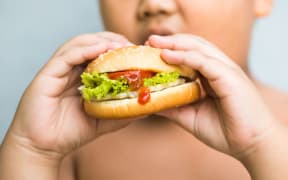The government's healthy food rating system has barely made an impact in the last two years, say health campaigners.
The voluntary Heath Star Food rating was introduced in 2014 to help consumers understand packaged foods - but only 22 companies have taken the system on board.
The voluntary system compares products with others in its food group and is rated out of five stars, taking into account, sugar, salt and fat content.

Photo: 123rf
Dietician Sarah Elliot co-owns Food Savvy, a nutrition company helping advise people about good food choices and giving supermarket tours to learn about food labels.
She said because the health star food rating had not been adopted by all companies it could be misleading for consumers.
Ms Elliot said because it was a voluntary scheme, some products that had no star rating could be healthy.
"People find that labelling is really confusing, the people use a lot of words and pictures to display what they think of products, and so label reading is a really good way to get to know products and get to know what to eat."
Ms Elliot said it would be easier for consumers if the Heath Star Food rating system was mandatory.
Health Minister Jonathan Coleman referred to it when addressing questions on tackling childhood obesity through a sugar tax, saying it was one way the government was addressing the problem.
The Ministry for Primary Industries which runs the programme said the system was now on over 1200 products.
Its specialist advisor for food labelling Phillippa Hawthorne said it could take awhile for packaging to be changed.
"It can take up to two years to get some of these labels onto the products and there's a lot of reasons for that, we've got changing of art work and things like that and then also we have been seeing some of the companies are re-formulating their products to get a better star rating before they bring them to market."
She said breakfast foods had been the quickest to take up the scheme with some re-formulating cereals to get a better star rating.
Food and Grocery Council chief executive Katherine Rich said it was trying to encourage other members to take up the scheme.
"We're providing free advice, even to non-members, about how to do their calculations and what they need to do to get organised to take up the Health Star Rating."
"I think in the long term the Health Star Rating scheme that's been developed in Australia and New Zealand is something globally that other countries can look at and see as a good solution."
But she said the food industry would suffer if the system was made compulsory.
"It's not one of those things that you could ever make mandatory, so imagine if you had a mandatory system and everything had to be re-labelled for New Zealand, given that it's a market the size of Sydney there would be a lot of international food companies that wouldn't bother to re-label and hence wouldn't send products here."
Anti-Obesity campaigner and Professor of Population Nutrition Boyd Swinburn said there was not enough labelling on the products.
"I'd like to see it go a lot faster and I'm sure consumers would, particularly consumers who would want to identify ... less healthy choices.
"This is the trouble with a voluntary scheme, it's completely up to industry to decide if they are going to participate and when they put the labels on the products."
But MPI said it was happy with the uptake and it would not be making it mandatory.
New Zealand companies that are displaying the Health Star Rating on their products include:
- New World
- Pak n Save
- Four Square
- Countdown
- Coca-cola
- Delmaine
- Fonterra Brands NZ
- Frucor
- Harraways
- Heinz Wattie's
- Kellogg
- Leader Products
- Life Health Foods
- Lion
- Nestle
- Pics real good peanut
- Pitango
- Prolife
- Red Seal
- Sanitarium
- Unilever





